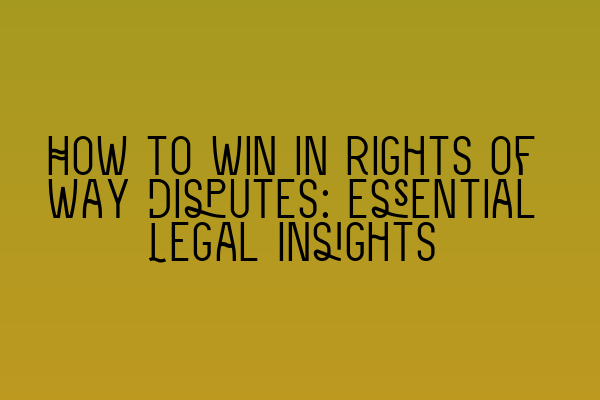How to Win in Rights of Way Disputes: Essential Legal Insights
Welcome to SQE Property Law & Land Law, where we are dedicated to providing expert guidance and insights on all aspects of property law. In this blog post, we will be discussing how to win in rights of way disputes, providing you with the essential legal insights you need to navigate these complex cases successfully.
Rights of way are legal easements that allow one person or party to pass through another person’s property. They are crucial for ensuring access to properties and can often become a source of contention between neighbors or property owners. Resolving rights of way disputes requires a thorough understanding of the relevant laws and legal principles, as well as effective advocacy skills.
Here are some essential legal insights to help you win in rights of way disputes:
1. Understanding the Legal Framework
Before pursuing a rights of way dispute, it is crucial to understand the legal framework surrounding this area of law. Familiarize yourself with the relevant legislation, such as the Land Registration Act 2002 and the Law of Property Act 1925, which govern rights of way in England and Wales. Additionally, research relevant case law to identify legal precedents that may support your case.
For a comprehensive understanding of the legal principles and limitations in property law, we recommend reading our article on Understanding Contractual Capacity: Rights and Limitations.
2. Gathering Evidence
A strong case in a rights of way dispute relies heavily on the evidence presented. Start by gathering any documents related to the rights of way, including deeds, conveyancing documents, and any correspondence between the parties involved. Additionally, take photographs and videos of the disputed area to provide visual evidence.
Consider also gathering witness statements from individuals who can attest to the existence or non-existence of the claimed right of way. These can be neighbors, previous property owners, or anyone with relevant knowledge of the area. The more evidence you have, the stronger your case will be.
3. Interpretation of the Rights of Way
Interpreting the terms and conditions of the rights of way is a crucial step in winning a dispute. The language used in the legal documents can sometimes be ambiguous or subject to various interpretations. Thoroughly analyze the wording of the rights of way to determine the extent and scope of the easement. Look for any limitations or conditions that may affect the validity or enforceability of the rights.
To brush up on your knowledge of contract law and interpretation, we recommend checking out our Interactive SQE Mock Tests for Contract Law: Test Your Knowledge.
4. Seeking Mediation or Alternative Dispute Resolution
Before resorting to costly and time-consuming litigation, consider exploring other options for dispute resolution. Mediation and alternative dispute resolution methods can be highly effective in resolving rights of way disputes amicably. A neutral third party can help facilitate negotiations and find a mutually satisfactory solution. This approach can save time, money, and preserve relationships between the parties involved.
5. Instructing a Property Law Solicitor
When dealing with complex legal matters such as rights of way disputes, it is essential to seek professional advice from a property law solicitor with expertise in this area. An experienced solicitor will guide you through the legal process, provide you with strategic advice, and represent your interests during negotiations or court proceedings.
At SQE Property Law & Land Law, we have a team of highly skilled solicitors who specialize in property law matters, including rights of way disputes. We stay up-to-date with the latest legal developments and have a proven track record of successfully resolving complex property disputes.
Conclusion
Winning in rights of way disputes requires a comprehensive understanding of the legal framework, gathering strong evidence, interpreting the terms of the rights of way, considering alternative dispute resolution methods, and seeking advice from a specialized property law solicitor. By following these essential legal insights and engaging the help of professionals, you increase your chances of achieving a favorable outcome in a rights of way dispute.
For further guidance and insights into contract law and other legal matters, we invite you to explore our related articles:
- Understanding Contractual Capacity: Rights and Limitations
- Interactive SQE Mock Tests for Contract Law: Test Your Knowledge
- Join Our SQE Contract Law Webinars: Expert Insights and Guidance
- Contract Law Reforms: An Analysis of Recent Changes
- Parties in a Contract: Rights and Responsibilities
If you require expert guidance or representation in a rights of way dispute or any property law matter, please do not hesitate to reach out to us at SQE Property Law & Land Law. Our team is ready to assist you in achieving the best possible outcome.
